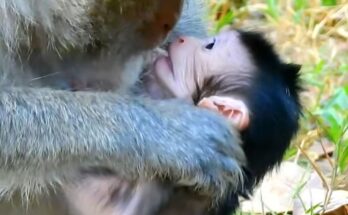Bringing a newborn baby into the world is often seen as a moment of celebration and unity. However, when a family’s acceptance and love are conditional or absent, it can create a heartbreaking and emotionally charged situation. This becomes even more complex when the baby is a hybrid—whether this term refers to a mixed-race child, an interspecies child in a fictional or metaphorical sense, or a child born of culturally or socially diverse backgrounds. The rejection by close family members, such as the mother and brother, can lead to a deeply painful experience for the newborn’s primary caretaker or parent, often manifesting as nonstop crying, emotional distress, and overwhelming despair.
The Emotional Toll of Rejection
A mother’s and brother’s rejection of a hybrid newborn can be profoundly disheartening for the parent trying to navigate this challenging situation. Rejection often stems from fear, ignorance, or prejudice—emotions deeply rooted in societal norms or personal biases. The mother, who is traditionally viewed as the central pillar of love and nurturing, might struggle to accept the hybrid baby due to internalized societal expectations or personal insecurities. Similarly, the brother’s rejection may be influenced by external pressures or a lack of understanding of the situation.
For the parent dealing with this lack of familial support, the nonstop crying can be a manifestation of grief, helplessness, and frustration. It is not only about the immediate rejection but also about the implications it has for the baby’s future—the fear that the child may grow up feeling unloved, unwanted, or ostracized within their own family.
Understanding the Roots of Rejection
To address the issue, it is crucial to delve into the root causes of the rejection. These may include:
- Cultural or Social Biases: In many societies, hybridity—whether racial, cultural, or otherwise—is often met with skepticism or disdain. The mother and brother’s rejection could stem from deeply ingrained prejudices that need to be addressed and unlearned.
- Fear of Judgment: The fear of societal judgment can weigh heavily on family members. They may worry about how the hybrid child will be perceived or treated by others, projecting their anxieties onto the child.
- Lack of Awareness or Education: A lack of understanding about what it means to be hybrid can lead to misconceptions and unfounded fears. Education and open dialogue are key to overcoming these barriers.
- Personal Insecurities: Sometimes, rejection is less about the child and more about the rejecting individual’s insecurities. The mother and brother might project their feelings of inadequacy or confusion onto the child.
The Impact on the Caregiver
As the primary caregiver, the parent’s mental and emotional well-being is critical in navigating this rejection. The nonstop crying could symbolize the intense emotional labor involved in advocating for their child while also dealing with their own sense of loss. Caregivers may feel isolated, betrayed, and overwhelmed, which can impact their ability to provide the nurturing environment the baby needs.
Steps Toward Healing and Reconciliation
While the situation may feel hopeless, there are steps that can be taken to foster healing and create a path toward acceptance:
- Open Communication: Initiating honest and non-confrontational conversations with the mother and brother can help uncover the reasons behind their rejection. Sharing personal feelings and emphasizing the child’s need for love and support may soften their stance.
- Education and Awareness: Providing resources or involving a mediator, such as a counselor or community leader, can help family members understand and overcome their biases.
- Building a Support Network: If immediate family members are unwilling to offer support, seeking a broader community of friends, extended family, or support groups can provide the emotional reinforcement needed.
- Therapy and Counseling: Professional guidance can help both the caregiver and rejecting family members navigate their emotions and work toward a resolution.
- Focusing on the Baby: Ensuring the newborn grows up in a loving and nurturing environment should remain the priority. Building a positive, affirming atmosphere can help counterbalance the lack of acceptance from certain family members.
The Power of Unconditional Love
The unconditional love of the primary caregiver can serve as a powerful counterforce to the rejection from other family members. Babies are remarkably resilient when surrounded by affection and care. Demonstrating unwavering love and acceptance can help the child develop a strong sense of self-worth, even in the face of adversity.
It is also important to remember that change is possible. While the initial rejection may seem insurmountable, time, patience, and persistent efforts to educate and connect with the rejecting family members can lead to eventual acceptance. Love has the capacity to break through barriers and transform even the most resistant hearts.
Conclusion
Nonstop crying due to a mother’s and brother’s rejection of a hybrid newborn is a profoundly challenging experience. It is a reflection of the caregiver’s pain, fear, and hopes for their child’s future. By addressing the root causes of rejection, seeking support, and focusing on the child’s well-being, it is possible to navigate this emotional storm and create a foundation of love and acceptance for the hybrid newborn. Healing takes time, but with determination and compassion, families can overcome division and find unity in diversity.


